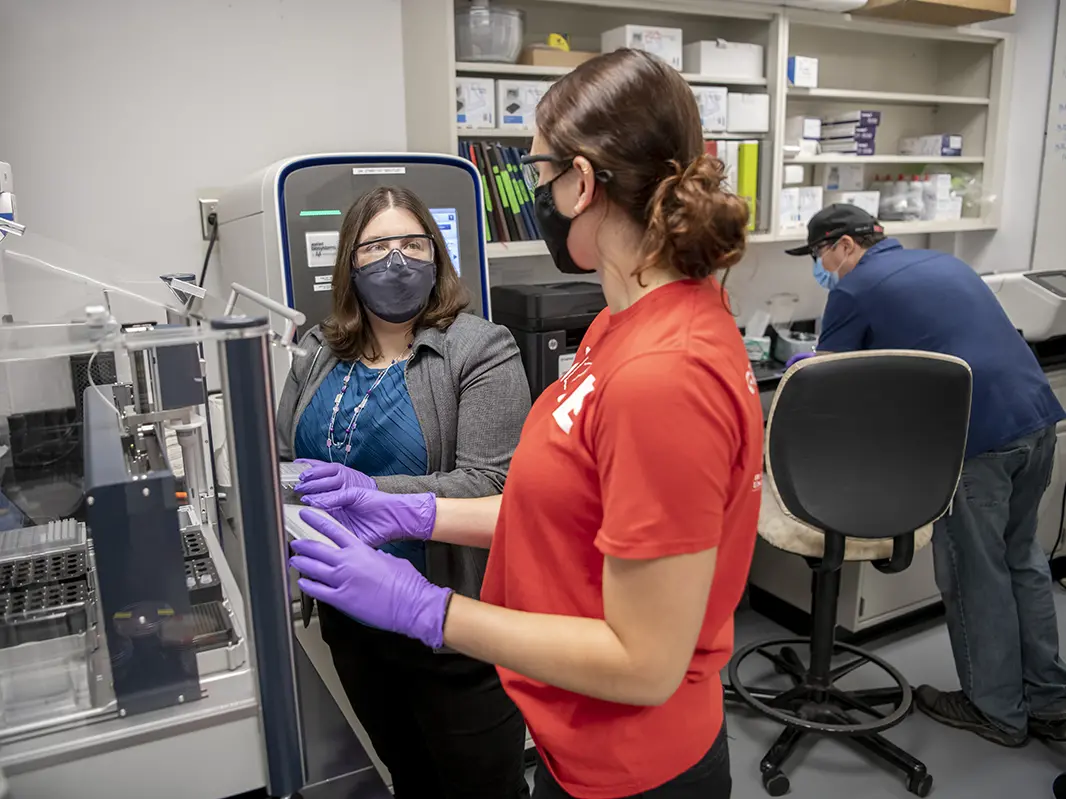It’s true: Healthy diets can promote mental wellness
Associate Professor Irene Hatsu, who studies how nutrition helps us focus and fight anxiety and depression, answers alumni questions.

Even though fruits and vegetables are not as nutrient-dense as they used to be, they’re still far healthier than processed foods. (Photo from Getty Images)
Does neglecting fruits and veggies affect anxiety? Is food insecurity a culprit in ADHD and mental health struggles in children?

Irene Hatsu is an associate professor of human nutrition in Ohio State’s Department of Human Sciences and an OSU Extension specialist for food insecurity. Her research reveals how food and nutrition security relate to health and mental wellness in children and vulnerable populations.
A recent study she co-wrote indicates kids who eat a healthier diet show less severe symptoms of inattention, an indicator of ADHD. While she primarily works with youth, specifically homeless children, her nutrition and wellness research encompasses all age groups.
She recently answered questions from alumni.
-
Do certain foods have a propensity to trigger or agitate anxiety and depression? — Tenley Braun ’16
The standard American diet consists mainly of ultra-processed foods high in saturated fats, added sugars and salt while devoid of fruits, vegetables, whole grains, lean proteins and healthy oils/fats. This dietary pattern has been associated with anxiety and depression in various populations.
Groups with healthier dietary patterns — such as the Mediterranean diet — have low prevalence of depression and anxiety. Dietary interventions based on consuming whole food diets and following healthy dietary patterns have been shown to improve depression.
-
Can including more fruits and veggies in the diet after retirement affect mental wellness, or does this need to happen in children and young adults? — Karen Scott ’84, ’86 MS, ’89 PhD
While the essential nutrients available in fruits and vegetables are important for the developing brains of children and young adults, they continue to be important for optimal brain function for adults and older adults alike. This makes the inclusion of more fruits and vegetables in the diet important to the mental health of individuals at all life stages.
-
What is a healthy diet for the elderly? — C. Arthur Mehaffey ’64,’70 MA
It is recommended that older adults consume a variety of foods from the various food groups. These include lean proteins (including seafood, beans and lentils), fruits and vegetables (choose from different varieties), whole grains and healthy oils and fats. Similarly, drink a lot of fluids (preferably water) and limit those with added sugar.
It also is important to avoid ultra-processed foods that are calorie-dense (with sodium, added sugar and saturated fats) and empty on nutrients.
-
What fruits are most healthy and not loaded with sugar? — Devon Phelps ’86
Despite the high sugar content of certain fruits, in general they are still an important part of a healthy dietary pattern. Fruits contain many nutrients (vitamins and minerals) and plant chemicals (polyphenols and anthocyanins, for instance) that are beneficial to health. Fruits that do not have a high sugar content include raspberries, blueberries, strawberries, blackberries, grapefruit and avocados.
Consuming fruits with other foods such as nuts or cheese can help slow the release of sugar from the fruit, which helps regulate blood sugar levels. Another important consideration is the portion size at each serving.
-
Are we getting the same level of nutrients in our fruits and vegetables today as our grandparents and those before them? — Walter Mendyka ’77, ’82
There is evidence that the mineral content of fruits and vegetables has decreased compared with what was available several decades ago. Now, many fruits and vegetables are said to be less nutrient-dense and contain more water. The declines in nutrient density have been attributed to factors including effects from changes in agricultural practices, geographical origins of the fruits and vegetables, and crop variety. The type of fertilizers used and the increase in carbon dioxide levels also are thought to reduce nutrient density. Despite this, it is still healthier to consume fruits and vegetables than processed foods.
-
How does a diet designed to optimize ADHD brains differ from a healthy diet for someone who’s neurotypical? Is there any downside for someone who doesn’t have ADHD following the diet recommended? — Michelle Cooper ’96
Currently, there are no known diets optimized for individuals living with ADHD. It is recommended, however, that such individuals and everyone else follow a healthy dietary pattern that provides adequate nutrients for optimal brain functioning. In addition, diets based on whole foods promote good physical health as well as overall general well-being. They can help prevent chronic diseases such as diabetes, heart disease and high blood pressure.



